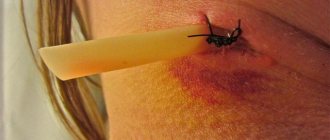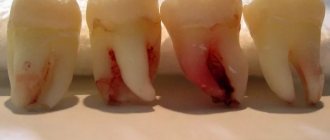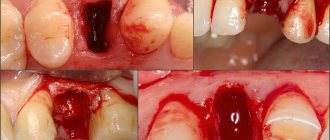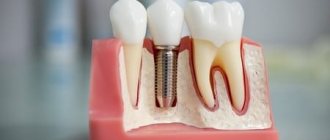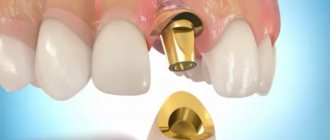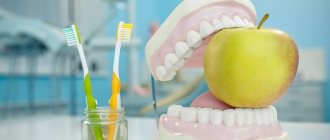Dental practice involves a large number of manipulations, accompanied by pain of varying severity. Fear of pain in the dentist's chair often forces the patient to refuse medical care until the last minute.
The most popular method of administering an anesthetic is infiltration with an average effect of up to 2 hours
Today, high-quality anesthesia is one of the criteria for which patients put forward the highest demands. People want to receive treatment in a comfortable environment, without unnecessary stress. There are several types of painkillers. Depending on the method of administration and the composition of the drug, anesthesia after dental treatment can last from a couple of hours to a day. The doctor chooses an option based on the complexity of the upcoming intervention.
Content:
- Methods used in dental practice
- Medicines that are most often used in the dental office
- What affects the duration of the anesthetic effect?
- What to do to quickly forget about dental intervention
- After what time can you eat?
Most people are afraid to have their teeth treated because they are afraid of pain.
It seems to them that any medical manipulation will cause them serious discomfort. Fortunately, the days of painful dental procedures are far behind us. Today, using highly effective anesthetics, doctors manage to make even the most complex procedures comfortable for the patient and completely painless. Meanwhile, some clients have a question about how long the anesthesia wears off after tooth extraction or pulpitis treatment. They are embarrassed by a long-lasting feeling of numbness. Let's consider this issue in more detail.
Sedation
Fear. This is the feeling that most people have when they think about visiting the dentist's office. Under a feeling of fear, movements become constrained, and especially impressionable people may even lose consciousness during or immediately before the procedure.
For emotional and physical relaxation, sedation is used in dentistry. Through a special mask, the patient inhales an oxygen-nitrogen mixture. Thanks to this, a feeling of calm appears. This procedure is in demand in pediatric dentistry, since it is usually difficult to calm a small child before the procedure.
If the patient has respiratory diseases or sensitivity to the components of the gas mixture, sedation is given intravenously. But this method is used extremely rarely.
Sedation in no way replaces anesthesia. It is used as an adjunct to calm and relax the patient. At the same time, he remains conscious throughout the session, and the effect of the gas wears off as soon as the mask is removed.
However, it is worth noting that despite all the seemingly positive effects of sedation, it is better to do without it. A clear mind and fresh consciousness allow you to quickly respond if necessary if something goes wrong.
Methods used in dental practice
How long it takes for the anesthesia effect to disappear depends directly on the method of anesthesia used. The sensitivity of tissues is restored most quickly when using an application. The doctor applies a special gel to the area of upcoming manipulations, which “freezes” for about fifteen minutes.
If the anesthetic medication was administered using a syringe and needle, the area will remain numb for up to one to three hours. The exact time is determined by the location of the treated area, the dose and type of drug.
Rules for choosing the right drug
Is anesthesia harmful? The answer to this question will depend on the competent choice of a suitable means for freezing. People who suffer from allergic reactions or bronchial asthma are advised to use products that do not contain preservatives, for example, Ultracaine D, and avoid drugs containing sodium disulfite.
For patients with diabetes mellitus and thyroid dysfunction, the dentist should select anesthetics without vasoconstrictor components (adrenaline or epinephrine) - Ultracain D, Scandonest.
For people with high blood pressure and pathologies of the cardiovascular system, teeth are numbed with a concentrated solution of adrenaline - Ultracain DS or Ubistezin. In case of serious heart disease or severe hypertension, drugs containing adrenaline are completely avoided. In this case, preference is given to Ultracain D.
For absolutely healthy people, anesthetics containing epinephrine in a concentration of 1:100,000 are selected. An adult can take up to 7 capsules at a time without harm to health.
Women who are breastfeeding are given injections of Ubistezin 1:20000 or Ultracaine SD. Both of these drugs are safe for pregnant women. The concentration of the active substance in anesthetics does not have a negative effect on the developing fetus.
It is impossible to refuse drugs with vasoconstrictor components during pregnancy and lactation. Adrenaline slows down the absorption of active components into the blood, which significantly reduces the concentration of the drug used in the pregnant woman’s body.
Medicines that are most often used in the dental office
If you need to numb a tooth, the doctor may use different drugs. The list of the most popular includes:
- Novocaine. Has a short period of action.
- Lidocaine and products containing articaine. Provides a medium-duration analgesic effect.
- Bupivacaine, Hirocaine, Ropivacaine. They have a long period of action.
The doctor determines which drug to choose taking into account the complexity of the upcoming treatment procedures. It is important that the patient is not allergic to the prescribed anesthetic.
Indications for the use of sedation and anesthesia
Sedation, as a mild sedative, is used in the following cases:
- small children
- severe fear of the procedure, dental phobia
- long and complicated operation
- strong gag reflex
As for anesthesia, it is not recommended in principle. It should only be used with the permission of a doctor in extreme cases. For example:
- several hour treatment
- panic attacks
- intolerance to local anesthetic components
It is worth mentioning separately about anesthesia for pregnant women. Pregnancy is a delicate situation in which you should carefully choose medications for treatment. Of course, general anesthesia and sedation are completely contraindicated during pregnancy. However, anesthetics based on ultracaine and primacaine are quite safe. They cannot penetrate the fetus and are used even during lactation.
What affects the duration of the anesthetic effect?
The same drug may work differently in different people. For example, for some the analgesic effect disappears in one hour, while for others it lasts two or even three hours. What affects the duration of anesthesia, besides the pharmacological characteristics of the drug itself? There are several fundamental factors:
- The presence of inflammation in the anesthetized area. For example, after the removal of a wisdom tooth that was painful, the rehabilitation period is always delayed. The fact is that the active compounds of anesthetics have an alkaline environment, and in a localized inflammatory focus it is acidic. The combination of the two media causes neutralization of the alkaline composition of the drug. Because of this, the pain relief effect either does not develop at all or disappears very quickly. With advanced inflammation, it is very important to correctly calculate the optimal amount of pain medication so that the patient does not feel acute pain during treatment.
- The inclusion of components in the administered drug that promote spasm of blood vessels. Such substances make the anesthetic more effective and increase the duration of its action.
- Patient's age. It is more difficult for older people to obtain pain relief, and the anesthetic effect lasts longer.
- The presence of diseases of internal organs. Metabolites of dental drugs are eliminated from the body due to the work of the kidneys and liver. If there are diseases of these organs, anesthesia lasts longer.
- Experience and accuracy of the dentist. When giving an injection, the doctor must follow the injection technique and accurately calculate the dose. Any mistake makes the result of using an anesthetic unpredictable.
Differences in anesthesia during treatment and removal
During tooth extraction, conduction anesthesia is used, which turns off the larger nerve and lasts longer. During dental treatment, pain relief is used for deep caries, pulpitis, and periodontitis. In such cases, infiltration and intraligamentary anesthesia is more often used. Freezing after tooth treatment goes away within a few hours; it lasts longer on the lower jaw than on the upper jaw. This is due to anatomical features: the upper jaw is less dense and has a better blood supply.
What to do to quickly forget about dental intervention
Very often, upon returning home, the patient continues to feel numbness in part of the jaw. This condition can cause discomfort and even mild aching pain. In order for tissue sensitivity to be restored as quickly as possible, the following rules should be followed:
- On the eve of planned dental procedures, avoid drinking alcohol , fatty and heavy foods. If a specialist recommends taking any medications, it is important to follow his prescription.
- In the case of treating caries , removing tartar, grinding down the top layer of enamel under a crown, it is permissible to massage the gums. You can also drink warm tea or heated water. These simple methods will increase local blood circulation and create conditions for the speedy release of anesthesia. But, if anesthesia was administered before tooth extraction, there should be no talk of any self-massage - touching the hole with your hands is strictly prohibited. Otherwise, you can damage the blood clot that protects the wound from the penetration of bacteria and germs. This will lead to severe inflammation and bleeding.
Don't be alarmed if the anesthetic continues to work for up to six hours. The situation will normalize on its own. If the numbness does not go away longer, this is a reason to consult a dentist again.
Modern painkillers
Several effective drugs are used for pain relief during dental treatment: Ultracaine (France), Ubistezin (Germany), Septanest, Scandonest.
Ultracaine is available with and without epinephrine. How long does freezing last? The absence of a vasodilator component in the composition reduces the duration of freezing to 15-20 minutes. Ultracaine can be injected into children and pregnant women. Among the contraindications to the drug are: heart failure, disruptions in the hormonal system.
Ubistezin is produced in 2 forms, differing in the concentration of epinephrine. How long does this anesthesia last? The duration of action of the anesthetic is 40 minutes. Can be used for patients with heart problems and high blood pressure.
Ubistezin is available in capsules stored in an iron container
Septanest contains adrenaline, articaine and preservatives. Not suitable for dental pain relief for allergy sufferers, but can be used during pregnancy and lactation. Action time: 45 minutes.
Scandonest, due to the lack of preservatives, has a minimal list of contraindications. The drug can be used in dental treatment in patients with diabetes mellitus, diseases of the thyroid gland and cardiovascular system and acts for 40 minutes.
When is the wound guaranteed to heal after removal of the “8” (wisdom tooth)
The resulting hole “heals” and heals within two to three weeks. The healing process begins with the formation of a blood clot, and epithelium forms on the surface of the wound. After complete healing, weight bearing on the operated area is allowed.
If the wisdom tooth was removed by a surgeon without complications, the wound will heal in about 15-18 days.
If certain problems arose (for example, the tooth had several roots), this period may increase to 25 days.
Only a dentist can evaluate the process of healthy or pathological wound healing. Ideally, it is recommended to visit a specialist’s office 5-7 days after removal of the “eight” to avoid complications.


